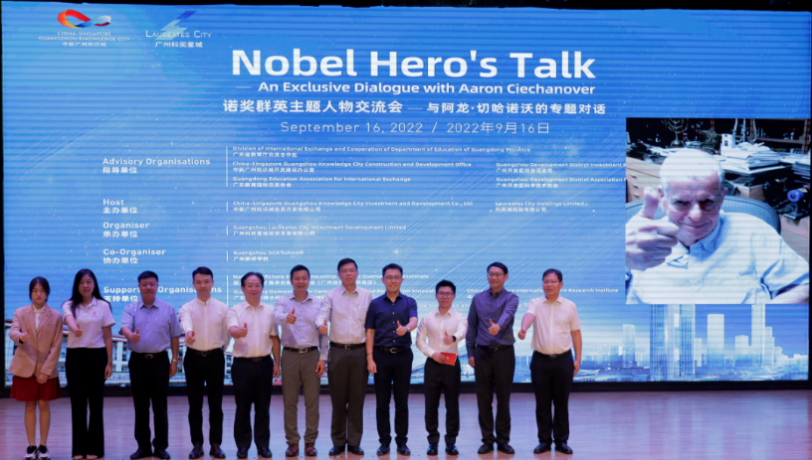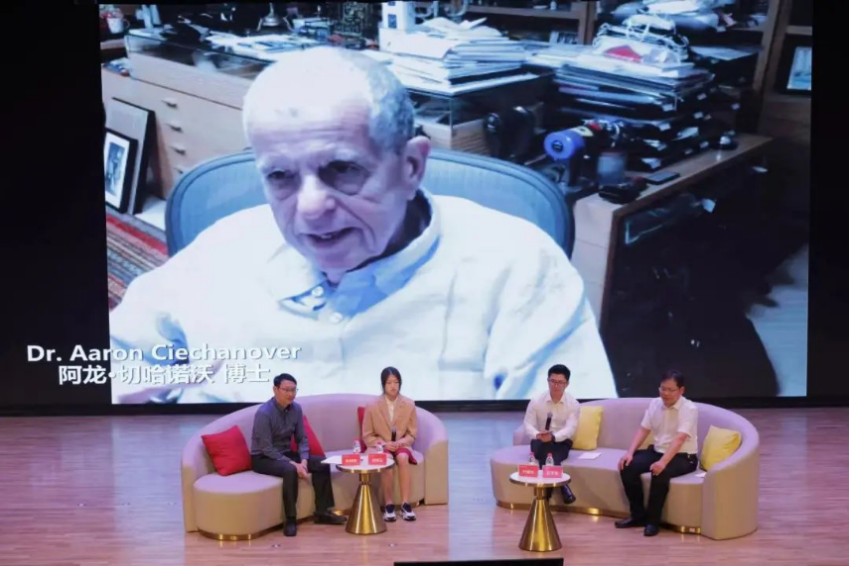On September 16th, the inaugural session of the Nobel Hero's Talk series took place successfully at Guangzhou SCA School in Knowledge City. This event was organized by the National Offshore Entrepreneurial Base for Overseas Professionals, the Guangdong Province Doctoral Postdoctoral Innovation Centre, CSIJRI, and the CSGKC School-Enterprise Innovation and Entrepreneurship Federation, under the guidance of the Exchange and Cooperation Office of the Guangdong Department of Education, the Guangdong Education International Exchange Association, the CSGKC Development and Construction Office, the Guangzhou Development Zone Investment Promotion Bureau, and the Guangzhou Development Zone Sci & Tech Association.

Through online and offline activities, the event aims to gather global scientific resources and talent to explore cutting-edge scientific topics. It also seeks to establish a communication platform for corporate institutions and science and technology elites in the Guangdong-Hong Kong-Macao Greater Bay Area, promote science education, and foster international scientific innovation and cooperation.
During the event, the Sci & Tech Association of Guangzhou Development Zone honoured the CSGKC Nobel Laureates Gallery as the "Practice Base for Science Popularization in the New Era." Dr Aaron Ciechanover, the recipient of the 2004 Nobel Prize in Chemistry, delivered an online session titled "Destruction of Cellular Proteins - from Remote Curiosity to the Centre Stage of the Pharma Industry and Medicine." In his keynote address, he presented his research findings and their practical applications and shared his lesser-known stories. Drawing from his journey into biochemical research and subsequent Nobel Prize win, he urged young individuals to pursue their passions, explore their preferred research areas, and discover their true worth.

During the Q&A session, Mr Zhao Junfeng, Principal Investigator at CSIJRI and Director of the Biopharmaceutical Teaching and Research Office at the School of Pharmacy of Guangzhou Medical University, engaged in a distinctive interaction with Dr Aaron Ciechanover. Let's delve into their conversation.
Mr Zhao Junfeng:
You are the first Israeli scientist to win the Nobel Prize. Could you please introduce the types of research that the Nobel Prize favours?
Dr Aaron Ciechanover:
I believe that the Nobel Prize is awarded to groundbreaking research that has the potential to profoundly impact society. For instance, our discovery involves an important yet previously unknown quality control system, which forms the basis for developing drugs to treat various diseases. This breakthrough has garnered significant attention in the scientific community and is expected to create employment opportunities worldwide. Another example is CRISPR, a gene-editing technology that enables the correction of genetic mutations, thereby eliminating genetic diseases. Additionally, CRISPR can be utilized to improve crop yields and aid farmers in achieving successful harvests. In my eyes, the development of the COVID-19 vaccine deserves a Nobel Prize. The use of RNA technology in this vaccine represents a novel approach with widespread public impact. Unlike traditional inactivated vaccines, synthesizing RNA proteins is relatively straightforward, making the creation of a new coronavirus vaccine a commendable and impactful endeavour. Another notable example is Tu Youyou, a Chinese pathologist who was awarded the Nobel Prize for discovering the anti-malarial compound artemisinin. Malaria afflicts millions of people each year, and her invention has saved countless lives. This recognition by the Nobel Committee underscores the importance of her contributions to medicine. I hope these examples serve as inspiration for others to pursue groundbreaking research that addresses pressing global challenges.
Mr Zhao Junfeng:
You've established close cooperation and exchanges with China's higher education and research circles at an early stage. So, you must be familiar with China's higher education landscape. I'm eager to hear your perspective on the Chinese higher education system. Could you share your thoughts on its characteristics and the primary differences you observe compared to the Israeli higher education system?
Dr Aaron Ciechanover:
I believe China is making strides in the right direction, with substantial government investments in its higher education system. However, it's important to note that the higher education systems in China and Israel differ, possibly influenced by cultural factors. In Israel, there's a prevalent entrepreneurial spirit and a sense of freedom among the populace, which may contrast with the complexities of managing a large, diverse country like China, encompassing nearly 60 ethnic groups and a population of 1.5 billion. Nevertheless, I see great potential for mutual learning and collaboration between China and Israel. China's progress in higher education deserves recognition, evidenced by the increasing number and quality of scientific research papers published by Chinese scientists each year.
Mr Zhao Junfeng:
How can China encourage its younger generation of scientists to undertake original research of significant importance?
Mr Aaron Ciechanover:
I believe Chinese higher education should grant young scientists more autonomy rather than keeping them under the direct guidance of professors. In Israeli universities, there's a concept notably absent in Chinese academia: leadership. When nurturing a young scientist, the emphasis should not be on directing or instructing them. Instead, we should give them complete freedom to explore and pursue their own paths.


